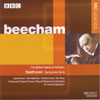Beethoven Symphony No 9
Flashes of that old Beecham magic but this Beethoven is a tough listen
View record and artist detailsRecord and Artist Details
Composer or Director: (composers) Various, Ludwig van Beethoven
Genre:
Orchestral
Label: BBC Music Legends/IMG Artists
Magazine Review Date: 9/2007
Media Format: CD or Download
Media Runtime: 72
Mastering:
Mono
ADD
Catalogue Number: BBCL4209-2

Tracks:
| Composition | Artist Credit |
|---|---|
| National Anthems, Movement: GREAT BRITAIN: God save the King/Queen (Anon) |
(composers) Various, Composer
(composers) Various, Composer Edinburgh Festival Chorus Royal Philharmonic Orchestra Thomas Beecham, Conductor |
| Symphony No. 9, 'Choral' |
Ludwig van Beethoven, Composer
Edinburgh Festival Chorus Kim Borg, Bass Ludwig van Beethoven, Composer Nan Merriman, Mezzo soprano Richard Lewis, Tenor Royal Philharmonic Orchestra Sylvia Fisher, Soprano Thomas Beecham, Conductor |
Author: Richard Wigmore
Judging by what Beecham is alleged to have said about the symphony (“Composed by a kind of Mr Gladstone of music”), Beethoven’s Ninth was a long way from his desert island short list. Truth to tell, this 1956 Edinburgh Festival broadcast, preceded by a typically grandiose rendering of the National Anthem, is less consistently inspired than his incandescent Missa solemnis (Somm, 5/01). But nowhere is there a hint of routine. Once you have adjusted to the congested sound and audience coughs, the opening movement is magnificently sustained, urgent yet flexible (a natural easing of the pulse for the woodwind’s pastoral carolling at 2'06"), its cataclysmic climaxes unerringly built and clinched.
In the Scherzo Beecham vindicates his ultra-steady tempo with his rugged rhythmic strength, evoking images of Thor’s hammer and the Nibelungen. He phrases the slow movement’s hymnic opening with an eloquent command of the long lyrical line, and brings an unusual surging intensity to the contrasting D major Andante sections. Later on, though, stasis can threaten, with the RPO’s aristocratic wind soloists allowed to savour their solos rather too much for the greater good.
It is the finale that, as so often, proves most problematic. Parts are memorable – the almost unhinged ferocity of the opening, the exquisite voicing and phrasing of the “Joy” theme. The coda, too, is as delirious as you will hear. In between, though, you will have to put up with woolly, wobbly choral singing, a crudely macho bass, soprano Silvia Fisher’s squally tones above the stave, and some tempi which even Beecham’s rhythmic vitality cannot prevent from sounding laboured. The Turkish march – sung with clear, ringing tone by Richard Lewis, by far the best of the soloists – and the ensuing fugue are ponderously earthbound; and Beecham slows further when the chorus re-enter at 7'18", turning what should be Dionysian ecstasy into…well, Gladstonian tub-thumping. Others may react more favourably. In any case, there is enough of the conductor’s genius on display here to make this an indispensable purchase for Beecham admirers.
In the Scherzo Beecham vindicates his ultra-steady tempo with his rugged rhythmic strength, evoking images of Thor’s hammer and the Nibelungen. He phrases the slow movement’s hymnic opening with an eloquent command of the long lyrical line, and brings an unusual surging intensity to the contrasting D major Andante sections. Later on, though, stasis can threaten, with the RPO’s aristocratic wind soloists allowed to savour their solos rather too much for the greater good.
It is the finale that, as so often, proves most problematic. Parts are memorable – the almost unhinged ferocity of the opening, the exquisite voicing and phrasing of the “Joy” theme. The coda, too, is as delirious as you will hear. In between, though, you will have to put up with woolly, wobbly choral singing, a crudely macho bass, soprano Silvia Fisher’s squally tones above the stave, and some tempi which even Beecham’s rhythmic vitality cannot prevent from sounding laboured. The Turkish march – sung with clear, ringing tone by Richard Lewis, by far the best of the soloists – and the ensuing fugue are ponderously earthbound; and Beecham slows further when the chorus re-enter at 7'18", turning what should be Dionysian ecstasy into…well, Gladstonian tub-thumping. Others may react more favourably. In any case, there is enough of the conductor’s genius on display here to make this an indispensable purchase for Beecham admirers.
Discover the world's largest classical music catalogue with Presto Music.

Gramophone Digital Club
- Digital Edition
- Digital Archive
- Reviews Database
- Full website access
From £8.75 / month
Subscribe
Gramophone Full Club
- Print Edition
- Digital Edition
- Digital Archive
- Reviews Database
- Full website access
From £11.00 / month
Subscribe
If you are a library, university or other organisation that would be interested in an institutional subscription to Gramophone please click here for further information.




